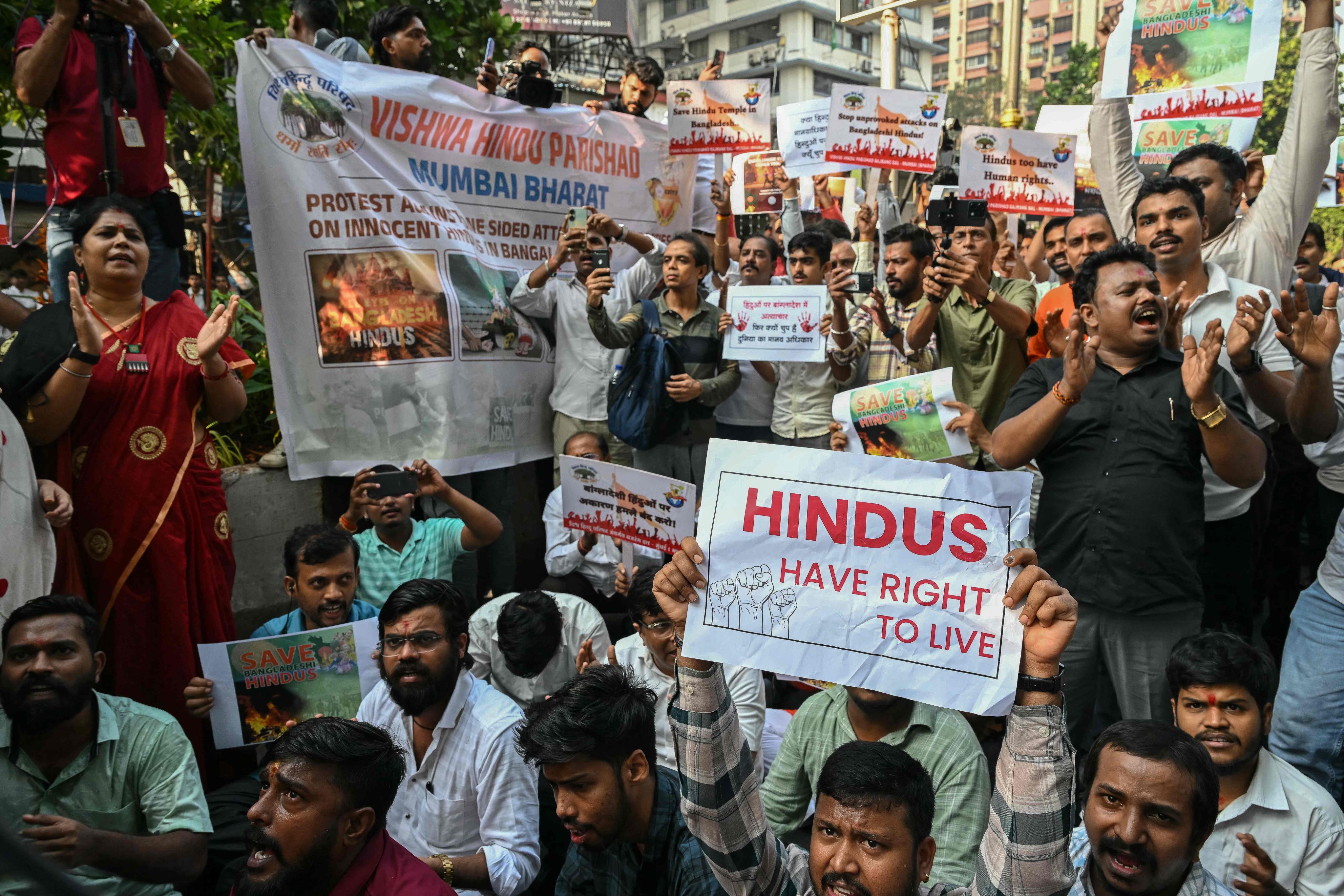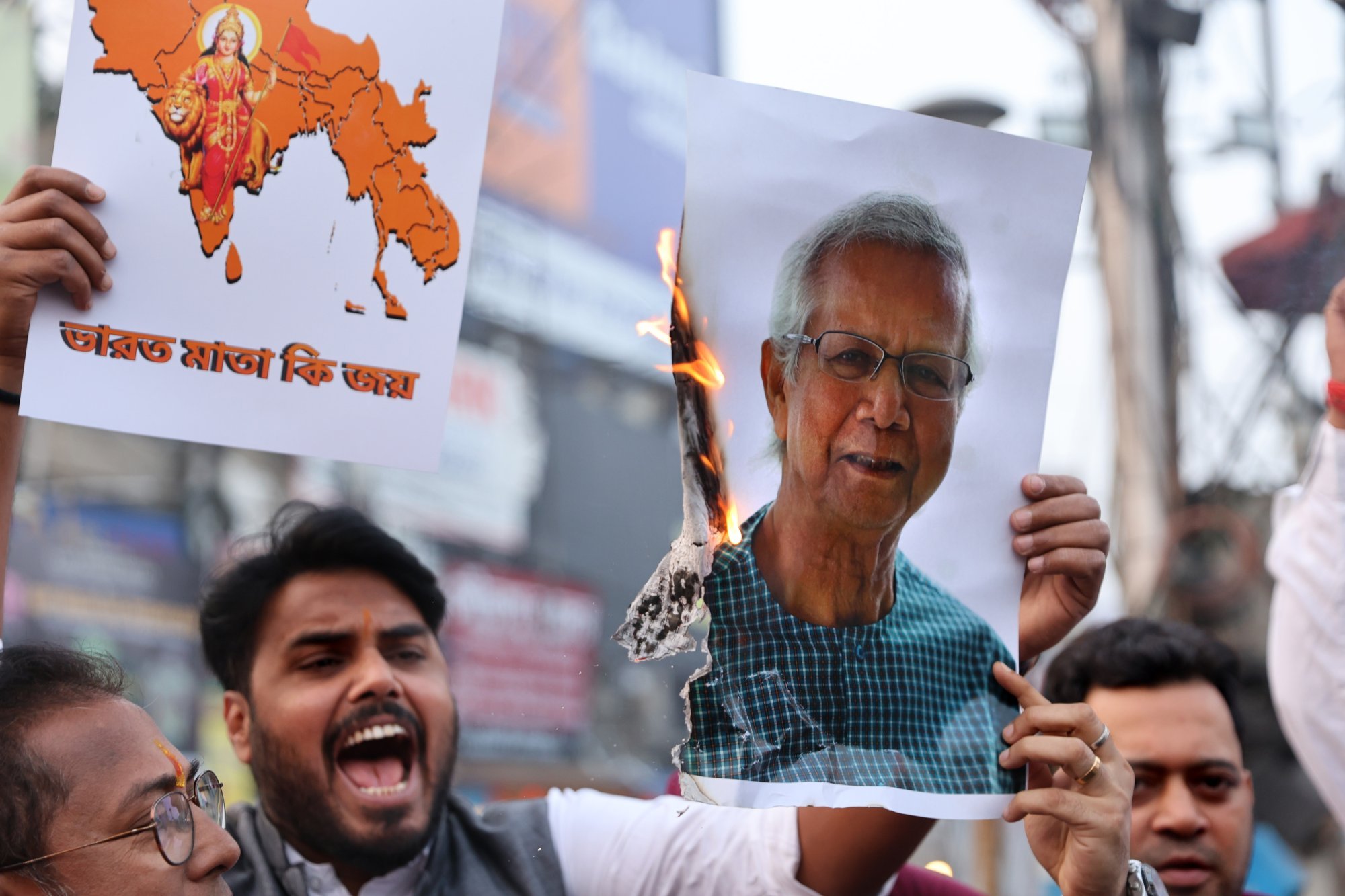Bangladesh misses chance to ease tensions with India over Hindu priest’s case
Dhaka has filed an appeal against a court order granting bail to Chinmoy Krishna Das, who was arrested last year over a flag incident

Bangladesh’s decision to appeal against a court order granting bail to a prominent Hindu priest is seen as a missed opportunity to ease tensions with India and signal its commitment to minority rights, with analysts warning the case may lead to worsening ties between the two neighbours.
Chinmoy Krishna Das, a religious leader and a former member of the International Society for Krishna Consciousness (ISKCON), was arrested and charged with sedition in November for disrespecting the Bangladeshi national flag during a political rally. The incident took place during the chaotic weeks following the collapse of the government of former Bangladeshi prime minister Sheikh Hasina in August.
Das, who enjoys significant influence among the Hindu minority in Bangladesh, had led rallies demanding greater protection for non-Muslim communities in the wake of the political turmoil. His arrest was seen by many in the Hindu community as politically motivated and also drew concern in India, which has long voiced concern over violence against Hindus in Bangladesh.
A two-judge bench of the Bangladesh High Court granted Das bail on Wednesday, but the government’s appeal means legal proceedings against him will continue.

While tensions between Muslims and Hindus in Bangladesh escalated into clashes following last year’s political turmoil, the situation has since calmed, according to analysts. Allowing the court’s decision to grant bail to Das to stand unchallenged would have helped signal a return to normalcy, they say.
Sreeradha Datta, an international affairs professor at Jindal Global University in Haryana, called the government’s decision to appeal against the court order “myopic.”
“If the court had dropped charges against him [Das] there was no point in the interim government not releasing him earlier,” Datta said.
Indian Prime Minister Narendra Modi and Bangladesh interim leader Muhammad Yunus held their first official meeting last month, during which Yunus had purportedly said the media reports of attacks on minorities in his country were “hugely inflated”.
However, hopes of a rapprochement between the once close neighbours have not materialised since the meeting between the two leaders.
Last month, New Delhi rescinded an order that permitted transshipment of goods from Bangladesh through Indian customs to third countries, a corridor that previously facilitated shipments of Bangladeshi garment exports.
Analysts said India’s decision was sparked by comments by Yunus in China, where he reportedly said India’s remote northeast was landlocked, in contrast with Bangladesh’s access to the Bay of Bengal for freight movement.
His comments were seen as a pitch for Chinese investment in an area considered by Delhi as strategically sensitive. Bangladeshi officials have said that the comments about the Bay of Bengal were intended to promote regional connectivity in long-neglected areas, not provoke tensions.
Datta said the interim Bangladeshi government should not upset India while pursuing its interests.
Bangladesh, which has been hit by high inflation and its crucial garment exports facing an imminent higher US tariff, needs to walk a careful path balancing the interests of India and China, according to analysts.
At the same time, India was also feeling apprehensive Dhaka’s active engagements with Pakistan, they added.
A report in India’s leading business daily The Economic Times linked Dhaka’s appeal against the bail order to the influence of Pakistan and the Bangladesh Jamaat-e-Islami, an Islamist political party.
The development comes at a time of heightened tensions between India and Pakistan over the killing of 26 tourists in Indian Kashmir by militants, with Delhi blaming Islamabad for the attack.
Bangladesh gained independence from Pakistan in 1971 after a war of liberation that was supported by India. It was previously known as East Pakistan and had been part of colonial India before the 1947 partition.
Restoring stability
Nilanjan Mukopadhyay, an independent political commentator, said the Bangladeshi government might have decided to appeal against the bail order because it felt Das had “crossed the Rubicon”.
The subject of minorities being targeted was a common concern that surfaced across the Indian subcontinent, Mukopadhyay said.
As such, Bangladesh should step up efforts to prevent violent incidents and enhance law and order, he added.
Priyajit Debsarkar, a London-based author who focuses on Bangladesh, said a correct decision over the case against Das could have helped ease tensions between Dhaka and Delhi significantly.
“The Yunus government has missed a critical opportunity to demonstrate that it is not hardline. It could have used this to show that Bangladesh has not discriminated against minorities. This could have given it a very strong weapon in its defence,” he said.
“What would happen now if the Supreme Court were to overturn the bail order ?” he asked.